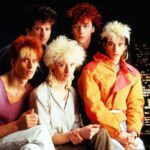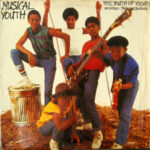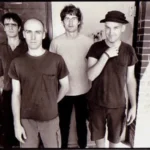 Kraftwerk, the pioneering electronic band from Düsseldorf, Germany, revolutionized the music landscape with their groundbreaking 1974 track, “Autobahn.” Blending minimalist lyrics, innovative production techniques, and an overarching conceptual approach, “Autobahn” transcended the boundaries of contemporary music. It became a cultural phenomenon that laid the foundation for countless musical genres and technologies, marking a pivotal moment in the evolution of modern music.
Kraftwerk, the pioneering electronic band from Düsseldorf, Germany, revolutionized the music landscape with their groundbreaking 1974 track, “Autobahn.” Blending minimalist lyrics, innovative production techniques, and an overarching conceptual approach, “Autobahn” transcended the boundaries of contemporary music. It became a cultural phenomenon that laid the foundation for countless musical genres and technologies, marking a pivotal moment in the evolution of modern music.
The Genesis of “Autobahn”
“Autobahn,” the title track of Kraftwerk’s fourth studio album, is an ode to Germany’s high-speed highways. Written by founding members Ralf Hütter and Florian Schneider, the song encapsulates the sensation of driving along the autobahn with a mix of serene and rhythmic soundscapes. The repetitive “Wir fahren, fahren, fahren auf der Autobahn” (“We drive, drive, drive on the Autobahn”) became a mantra that fused the everyday with the futuristic.
At its core, “Autobahn” represented a departure from Kraftwerk’s earlier, more experimental works. It was their first track to incorporate vocals, albeit sparsely, and a deliberate effort to embrace a more melodic and structured form of music. This strategic shift demonstrated the band’s desire to engage broader audiences while retaining their avant-garde essence.
Musical Innovation
Kraftwerk’s “Autobahn” was a technological marvel for its time. The track, which spans over 22 minutes in its original album version, used groundbreaking equipment and production techniques. The band employed synthesizers such as the Minimoog and ARP Odyssey, as well as drum machines and custom-built electronic devices, to craft its iconic sound.
The song’s structure mirrored the experience of a road trip, with a beginning, middle, and end that simulated the ebb and flow of highway travel. This auditory journey was enhanced by Kraftwerk’s use of motorik rhythm—a steady, pulsating beat characteristic of German krautrock. Layered melodies and sound effects, including car horns, passing vehicles, and the hum of an engine, added to the immersive quality of the piece.
Crucially, “Autobahn” marked one of the earliest instances of using electronic instrumentation as the dominant musical element in a popular song. While synthesizers had been used sporadically in rock and experimental music, Kraftwerk positioned them at the forefront, signaling the dawn of a new era in music production.
Cultural Impact
Upon its release, “Autobahn” became a commercial and critical success. The edited single version, trimmed to just over three minutes, achieved significant airplay on radio stations worldwide, reaching the top 40 charts in several countries, including the United States. This level of mainstream recognition was unprecedented for an electronic track at the time, challenging the dominance of rock and pop music.
The song’s success helped redefine perceptions of electronic music, which was often dismissed as niche or novelty. Kraftwerk’s meticulous craftsmanship and conceptual artistry demonstrated the genre’s potential for emotional depth and mass appeal. “Autobahn” became a cultural touchstone, influencing not only musicians but also visual artists, filmmakers, and designers who drew inspiration from its futuristic aesthetic.
Influence on Music Genres
The release of “Autobahn” was a watershed moment that catalyzed the development of multiple music genres. Here are some key areas of its influence:
1. Synthpop and New Wave
Kraftwerk’s embrace of electronic instrumentation directly inspired the emergence of synthpop in the late 1970s and early 1980s. Bands such as Depeche Mode, Human League, and Soft Cell cited Kraftwerk as a primary influence, adopting their use of synthesizers and minimalist melodies. “Autobahn” demonstrated that electronic music could be both experimental and accessible, paving the way for a wave of artists who blended technology with pop sensibilities.
2. Techno and House
The repetitive, hypnotic rhythms of “Autobahn” laid the groundwork for the rise of techno and house music in the 1980s and 1990s. Detroit techno pioneers like Juan Atkins, Derrick May, and Kevin Saunderson acknowledged Kraftwerk’s influence on their work. The band’s mechanized beats and forward-thinking approach to production resonated with these artists, who sought to create music that reflected the industrial and technological landscapes of their environments.
3. Ambient and Experimental Music
“Autobahn” also had a profound impact on ambient music. Artists like Brian Eno and Aphex Twin explored the atmospheric and textural qualities of electronic soundscapes, taking cues from Kraftwerk’s ability to evoke imagery and emotion through synthesized tones. The song’s dynamic structure and use of environmental sound effects served as a blueprint for creating immersive auditory experiences.
4. Hip-Hop and Sampling Culture
Kraftwerk’s influence extended into hip-hop, particularly through the art of sampling. Afrika Bambaataa’s 1982 track “Planet Rock,” often considered one of the most important songs in hip-hop history, prominently sampled Kraftwerk’s “Trans-Europe Express” and “Numbers.” While “Autobahn” itself was not directly sampled, its innovative use of electronic rhythms and melodies set the stage for Kraftwerk’s broader integration into hip-hop culture.
Technological Advancements
Beyond its musical legacy, “Autobahn” underscored the potential of electronic technology in the recording and production process. Kraftwerk’s innovative use of synthesizers, drum machines, and sequencers influenced the development of music technology, encouraging manufacturers to create more sophisticated and accessible equipment.
The band’s adoption of the vocoder—a device that modulates the human voice using electronic signals—was another milestone. While not used extensively in “Autobahn,” the vocoder became a hallmark of Kraftwerk’s sound in subsequent albums, further bridging the gap between human expression and machine precision.
Legacy
Nearly five decades after its release, “Autobahn” remains a touchstone in the history of music. It continues to be celebrated for its visionary approach and enduring relevance in a constantly evolving musical landscape. The song’s emphasis on innovation and its embrace of new technologies resonate with contemporary artists who seek to push boundaries and redefine genres.
Kraftwerk’s influence can be seen in the work of artists across the spectrum, from electronic and pop musicians to hip-hop producers and experimental composers. The band’s pioneering spirit and commitment to their artistic vision have made them icons of modern music, with “Autobahn” standing as a testament to their transformative impact.
Conclusion
“Autobahn” was more than a song; it was a cultural revolution that challenged the status quo and charted a new course for music. By embracing technology, minimalism, and conceptual artistry, Kraftwerk redefined what music could be and inspired generations of artists to follow in their footsteps. As we continue to explore the possibilities of sound and innovation, “Autobahn” serves as a reminder of the power of creativity to shape the future.
This post has already been read 89 times!









